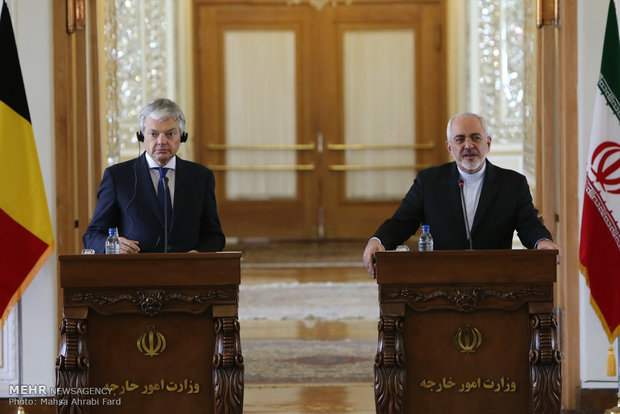TEHRAN– Foreign ministers of Iran and Belgium held a joint presser on Monday to elaborate on their ideas over regional and bilateral issues.
‘We Talked about a host of issues from technical, technological, and economic areas,’ said Mohammad Javad Zarif Iran’s Minister of Foreign Affairs in his joint presser with his Belgian counterpart Didier Reynders, according to the Iranian Mehr News.
The press conference came after the meeting of the two officials as Belgian Foreign Minister is paying a two-day visit to Tehran in accompany of Belgian Minister of Energy Marie Christine Marghem and a high-ranking political and economic delegation.
The development of ties to broaden economic and developmental relations was among the major areas of our discussions, highlighted the Iranian foreign minister.
Zarif reiterated his belief in bolstering bilateral interactions between Tehran and Brussels and recounted that a Memorandum of Understanding (MoU) was signed to enhance political interactions between the two countries.
Iran’s chief of diplomacy added that the signed MoU covers interactions in fields of human rights, protection of environment, war on terror and extremism, regional and bilateral interests.
‘Dialogue over issues that we hold whether common or different ideas about, can be followed in a more comprehensive and standardized scale,’ said Zarif.
Touching upon the Syrian crisis, Zarif dismissed the claims that UN envoy on Syrian crisis accused Iran of increasing frictions in Syria and assured the good interaction between Tehran and UN over the mayhem in Syria.
Iran has always endeavored to solve the issue in Syria, and unlike some friends who believe in a military solution for the crisis, still insists on a political solution, affirmed Iran’s Minister of Foreign Affair.
He underlined that standing against terrorists is the duty of the whole international community and lamented the unacceptable measures of some countries have led to shedding more civilian blood in Syria.
‘We hold that the world must fight terrorism and let Syrians themselves decide over their destiny,’ reiterated Zarif.
Later, Zarif questioned how the ISIL sells oil and uses bank accounts for its financial affairs while ‘they are terrorists who use the money to kill civilians.’
Again he referred to the international community to shoulder the responsibility to cut the supporting hands of the terrorists.
‘Unfortunately there are still some countries who have not fully comprehended the dangers of the ISIL and terrorism, not only for a region but for the whole world, and keep supporting terrorists for the sake of their temporary interests,’ regretted Zarif.
The Iranian chief diplomat stressed that the idea that the political decision for the Syria has to be made out of Syria to let the Syrians later fight terrorism is an upside-down equation that should be amended; ‘the world must eliminate terrorists to let Syrians decide for their country.’
Commenting on the agenda of the next round of Vienna talks on Syrian crisis, Zarif ascertained that, for the Islamic Republic of Iran, the first question asking who are the terrorists in Syria is answered already.
Zarif added that agreement over the continuation of talks is the second agenda of the next round of talks.
‘We can only facilitate the way for proceeding of the affairs but the decision is solely up to Syrians themselves to be made,’ Zarif reiterated.
On Iran-Sextet talks over the implementation of the JCPOA on the sidelines of the next round of Vienna Conference on Syria, Zarif recounted that the talks over redesigning of Arak heavy water reactor are done but the method of signing the document is still debated as all the foreign ministers are not present in Vienna.
He maintained that signing the document is a very important step that should be done as soon as possible.
Belgian Foreign Minister Didier Reynders, for his part, voiced his gratitude for the hospitability demonstrated by Iranians in welcoming him in Tehran and hailed the 125 years of good relations between the two nations.
He voiced hope that the two countries can cooperate in areas of tariffs and environment.
Referring to Belgium’s retrieval of historical objects of Iran’s history Reynders voiced readiness to hand some other major historical documents to Iranians.
‘We signed a MoU to cooperate in all political aspects and the human rights can be another area of bilateral cooperation,’ held the Belgian FM.
He pointed to 20 Belgian companies who sent their representatives to Tehran and described it a good sign for economic cooperation of the two countries.
Touching upon the Vienna agreement of July 14, he thanked his Iranian counterpart for clinching such an accord and voiced hope for talks after the implementation of the agreement.
‘As a nuclear deal was possible, other areas of cooperation are accessible via talks,’ said the Belgian official.
He also referred to the history of bilateral cooperation in areas of nuclear medicine and artistic affairs and hoped for expansion of relations in those areas.
‘We also thank Iranians for their constructive role in solving regional issues in Syria and Iraq,’ Reynders said.
He described terrorism and extremism as the major challenges of the world at the present stage and lamented that Belgium was the first country who suffered from the return of ISIL terrorists to Europe.
Touching upon the crisis in Yemen, Reynders prioritized talks over air-strikes and affirmed that sitting around a table of negotiation is the sole solution of the crisis in the Arab peninsula.
M.Wassouf

